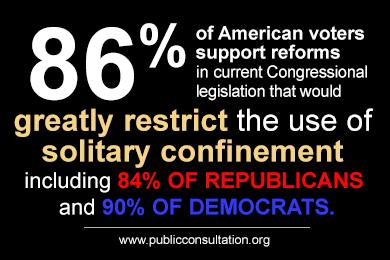
Five in Six Voters Favor Sharply Restricting Use of Solitary Confinement
An overwhelming majority (86%) of American voters support reforms in current Congressional legislation that would greatly restrict the use of solitary confinement, including 84% of Republicans and 90% of Democrats.
In the innovative survey of 2,487 registered voters by the Program for Public Consultation (PPC) at the University of Maryland, respondents evaluated proposals based on two Congressional bills for restricting the use of solitary confinement. Only 10% (Republicans 12%, Democrats 7%) rejected both proposals.
The more restrictive proposal, selected by 28% (Republicans 13%, Democrats 40%), would prohibit any use of solitary confinement for disciplinary purposes. Inmates would receive regular medical and mental evaluations, and if at any time the medical professional determines that solitary is having adverse health risks, the person in solitary would have to be removed. This proposal would limit the period to 15 days in a row and no more than 20 days in a two-month period.
The most popular proposal, selected by 58% (Republicans 71%, Democrats 50%), would be similar to the first in the event of an inmate posing a threat to themselves or others, but would also allow solitary confinement to be used as punishment for serious violations. Time in solitary for disciplinary purposes would be limited to 30 days in a row and no more than 40 days in a two-month period.
Those who favored the option that would allow solitary confinement to be used as punishment for serious violations were asked, if they were a Member of Congress and the narrower option were the only option, how they would vote. Another 25% of the full sample said they would vote for the more restrictive proposal, which would ban the use of solitary confinement for any disciplinary purposes. Together with those who initially supported the proposal, 52% favored the idea (Republicans 35%, Democrats 70%).
Also, a bipartisan majority (75%) said they would find the narrower proposal at least “tolerable,” including 62% of Republicans and 87% of Democrats.
These Congressional bills, sponsored by Senator Dick Durbin and Representative Bonnie Watson Coleman, are similar to legislation passed in states limiting the use of solitary confinement in state prisons and jails, most recently in New York state.
Currently, there are no Federal time limits on the period of time in solitary confinement. About one in five prisoners or about 450,000 prisoners are put in solitary confinement at some point each year. About 10% of people who are put in solitary are kept there for three years or more, with some kept there for decades. There are also no Federal specifications about what type of offense would justify the use of solitary confinement; there are cases in which it has been used as punishment for a minor violation such as unauthorized smoking or using profanity.
African Americans and Hispanic inmates are placed in solitary confinement at greater rates than Whites. In the survey, the initial views of the proposals among African American and Hispanic voters were not significantly different from the general population.
Respondents were also asked about two Congressional proposals related to the rates prisoners are charged for making phone calls. These rates are substantially higher than for ordinary phone calls.
A bipartisan majority of over three-in-four (77%) favored limiting the rates charged for phone calls in prison to the rates that companies normally charge for such service (Republicans 66%, Democrats 88%). A bare majority of 52% went further and favored a proposal requiring prisons and jails to provide at least 15 minutes of free phone calls a day (Republicans 33%, Democrats 70%).
The survey was conducted online from February 12-22, 2021 with a national probability-based sample provided by Nielsen Scarborough from its larger sample of respondents, who were recruited by mail and telephone using a random sample of households. The sample included 2,487 respondents with a margin of error of +/- 2.0%.
- Executive Summary of Findings (PDF): http://publicconsultation.org/wp-content/uploads/2021/07/SolitaryReport2021.pdf
- Questionnaire with Frequencies (PDF):
http://publicconsultation.org/wp-content/uploads/2021/06/CriminalRecords_Solitary_Quaire_0421.pdf - Try the Policymaking Simulation: https://survey.alchemer.com/s3/6407925/Solitary-Confinement-Phone-Calls-from-Prison

Be the first to comment